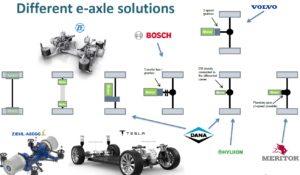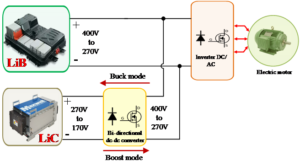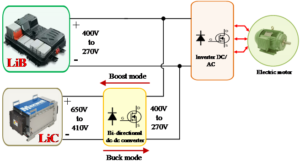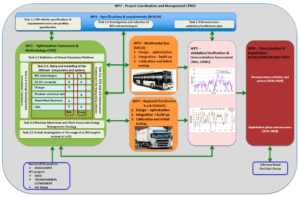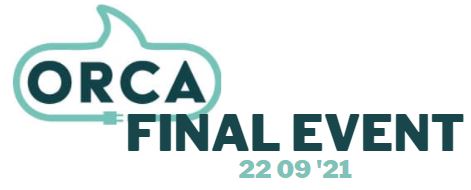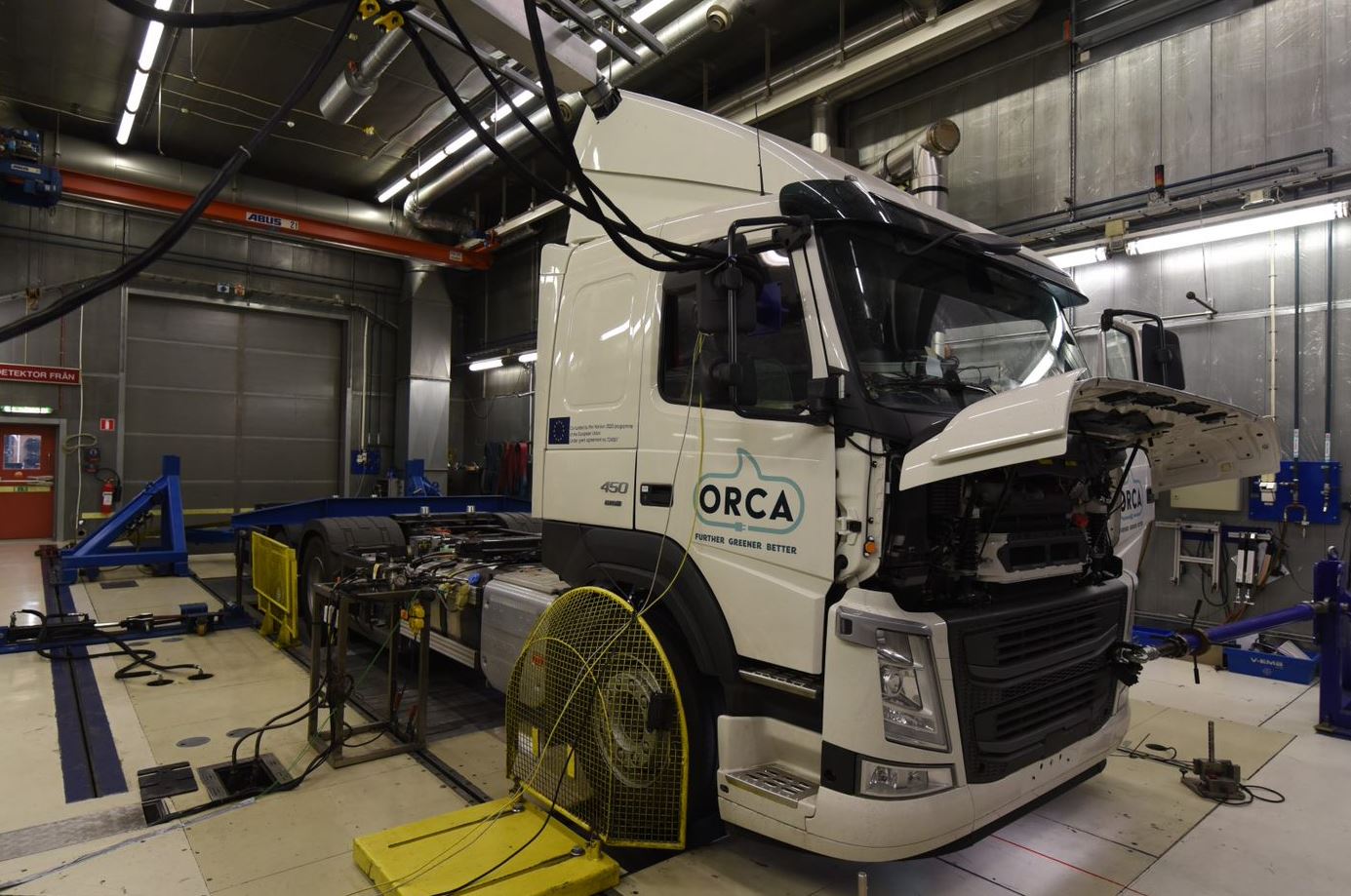On 17th October 2017, 25 experts of the ORCA consortium came together at IVECO’s premises in Turin, Italy for the 1st Internal ORCA Workshop to discuss “Hybrid Electric Vehicles Design”.
The ORCA project (Optimised Real-world Cost-Competitive Modular Hybrid Architecture for Heavy Duty Vehicles) aims to develop two demonstrators: an IVECO multimodal (plug-in) hybrid bus and a VOLVO distribution (plug-in) hybrid truck, both with an extended full electric range from 10km to 30km. Vehicles will be equiped with innovative PHEV rechargeable energy storage (RES) systems, and will be developed to operate in low emission zones using advanced control systems.
Furthermore, the ORCA heavy-duty vehicles prototypes aim at a 40% reduction in fuel consumption and 40% reduction in emissions while the total cost of ownership (TCO) remains the same in comparison to their conventional counterparts.
The ORCA project therefore develops technical innovations in the engine, powertrain and battery design to improve the hybrid powertrain efficiency up to 5% and downsize the engine by at least 50% compared with actual IVECO hybrid bus and VOLVO conventional truck.
To achieve its ambitious goals and to share know-how within partners, the ORCA consortium organizes annual Internal Workshops.
On 17th October 2017, 25 experts of the ORCA consortium came together at IVECO’s premises in Turin, Italy for the 1st Internal ORCA Workshop to discuss “Hybrid Electric Vehicles Design”.
Four specific topics were elaborated in-depth:
- Electric Axles for HD trucks
- Chaired by Volvo Technology AB (VOLVO)
- Rechargeable energy storage (RES) systems for HD vehicles
- Chaired by Johnson Matthey Battery Systems Engineering Limited (JMBS) & JSR Micro NV (JSR)
- Integration of Li-Caps and Li-Batteries
- Chaired by Vrije Universiteit Brussel (VUB) & Johnson Matthey Battery Systems Engineering Limited (JMBS) & IVECO S.p.A. (IVECO)
- Hardware/Software Co-Design Methodology
- Chaired by Nederlandse Organisatie Voor Toegepast Natuurwetenschappelijk Onderzoek (TNO) & Vrije Universiteit Brussel (VUB) & Volvo Technology AB (VOLVO)
The participants of the workshop represented the entire ORCA consortium:
Nederlandse Organisatie Voor Toegepast Natuurwetenschappelijk Onderzoek (TNO), Volvo Technology AB (VOLVO), IVECO S.p.A. (IVECO), Vrije Universiteit Brussel (VUB), Valeo Systèmes de Contrôle Moteur SAS (VSCM), Johnson Matthey Battery Systems Engineering Limited (JMBS), JSR Micro NV (JSR), Robert Bosch GMBH (Bosch), Centre Ricerche Fiat SCPA (CRF), Altra SPA (Altra), Fraunhofer Gesellschaft Zur Foerderung Der Angewandten Forschung E.V. (FRAUNHOFER).
Internal Workshop on Hybrid Electric Vehicles Design
In this workshop, 25 experts of the ORCA consortium have discussed with each other the promising topic „hybrid electric vehicles design“, that is linked to the project activities, and there was a focus on four specific topics as described below.
Electric Axles for HD trucks
The session focused on the methodology on how to re-build a truck or tractor with an electric axle and battery pack in line with the project objectives. Different feasible e-axle solutions were presented and discussed, including both their advantages and disadvantages. The most appropriate one will be used for the ORCA demonstrator, which will be delivered during the second half of 2018.
Rechargeable energy storage systems for HD vehicles
In the ORCA project, a modular and scalable rechargeable storage system (hybrid or non-hybrid concepts) will be developed for the different heavy-duty applications. Therefore, the optimal sizing of the rechargeable energy storage (RES) in terms of voltage and capacity and the combination of RES technologies will be further investigated. During this session, different solutions were compared in terms of cost and complexity against the application architecture and requirements. The required models (i.e. electrical, thermal, lifetime) of the considered RES technology have also been discussed. The 3D thermal model, which was developed in order to investigate the thermal behavior of the RES system and to investigate the optimal thermal management strategy was presented. Discussions took place on the State of Health (SoH) estimation, optimal sizing and on the modular design that are on-going activities in the project and thoughts were shared on the extended life cycle tests to investigate the impact of the proposed RES technology for the different demonstrators.
Integration of Li-Caps and Li-Batteries
Several case studies have been elaborated during the session. In line with the initial specifications, a lithium ion battery selection study has been previously done, resulting in a four cell shortlist (including four different types of chemistry). The ORCA project will select one viable candidate technology for progression. A headline assessment of overall battery architecture has been carried out allowing for an estimate of overall battery mass, volume and power capability in charge and discharge for peak and continuous loads.
Two options for integration of Li-Capacitors and Li-ion Batteries that allow different performances have been discussed, including advantages and disadvantages of the different options. After knowing the cost, size, weight of the possible DC-DC converters, the best option (including Li-ion cell type and number of cells) will be selected for the ORCA demonstrators based on the latest electric motor performance targets. Some of these configurations that are designed based on low and high voltage LiC systems with DC/DC converter are shown in the following figure.
The hybrid energy storage system (HESS) configurations have been reviewed and the potential commercial DC/DC converters and suppliers were discussed. The investigation done on possible HESS configurations has been in-depth explained, and the comparison of DC/DC topologies has been elaborated.
Hardware/Software Co-Design Methodology
Optimal design of Hybrid Electric Vehicles (HEVs) involves the sizing of the engine and the electrical components on the one hand and the design of an Energy Management Strategy (EMS) that controls the power flow split between the engine and the electric motors on the other hand. That is because the achievable performance by the EMS is limited by the physical limitations of the HEVs’ powertrain. As a result, design of the plant and its controller need to be addressed simultaneously in the design phase with an integrated manner to obtain an optimal system design. The aforementioned integrated manner is referred as hardware/software co-design methodology which is focused topic in this section.
Challenges for the development of the co-design methodology have been elaborated to show the mutual and complex relations among relevant factors to the TCO. Moreover, different transport assignment use cases have been presented and discussed, focusing on interregional haul with conventional/hybrid driveline. The transport assignment consider city, regional and highway distribution with both hybrid and full electric driving mode. Two co-design methodologies were investigated and compared: the deterministic brute-force and the stochastic Search. Besides, some prelimiary simulation results have been described and discussed during this section.
Conclusions
The ORCA project set several ambitious goals for its two demonstrators: an IVECO multimodal hybrid bus and a VOLVO distribution hybrid truck:
- extended fullelectric range from 10km to 30km;
- improved hybrid powertrain efficiency up to 5%;
- downsized engine by at least 50%.
compared to actual IVECO hybrid bus and VOLVO conventional truck.
To achieve these goals, during the first year of the project the investigation and selection of RES cell technologies and the HD vehicle specifications/requirements and user profiles specification have been done and a demonstrator validation plan was carried out as well as the definition of the multi-modal hybrid traction system architecture. The system co-design framework was proposed and being developed.and developed.
The 1st Internal ORCA Workshop focused on the upcoming tasks in order to steer the proper way for successfull implementation and build-up of the two ORCA demonstrators.


